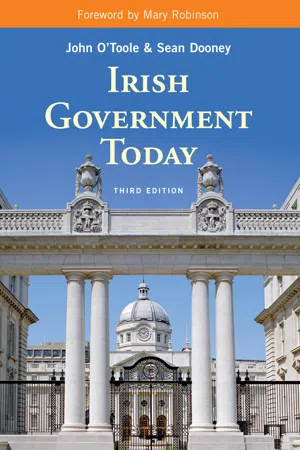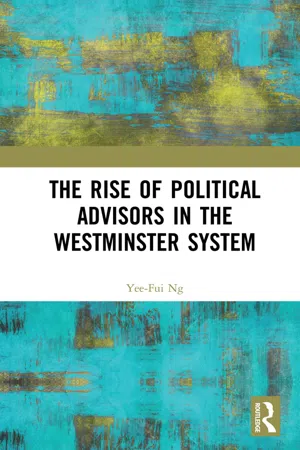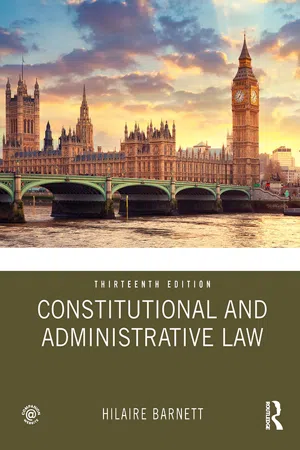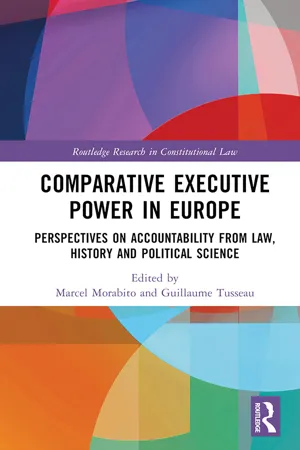Politics & International Relations
Ministerial Responsibility
Ministerial responsibility refers to the principle that government ministers are accountable to the parliament or legislature for their actions and the actions of their departments. This means they are expected to answer questions, provide explanations, and ultimately take responsibility for any failures or misconduct within their areas of authority. It is a key aspect of democratic governance and the separation of powers.
Written by Perlego with AI-assistance
Related key terms
Related key terms
1 of 4
Related key terms
1 of 3
9 Key excerpts on "Ministerial Responsibility"
- eBook - ePub
- John O'Toole(Author)
- 2009(Publication Date)
- Gill Books(Publisher)
The Public Service Management Act 1997 also requires the preparation of strategy statements by secretaries general, in which they specify the key objectives, outputs and related strategies (including the use of resources) to be pursued by the department. The strategy statement must be approved by the relevant minister, who arranges for it to be laid before the Oireachtas. There is also a requirement to prepare progress (annual) reports on its implementation. According to the Working Group on the Accountability of Secretaries General and Accounting Officers (Mullarkey report 2002), ‘The objective in building the concept of outputs into the departmental strategy statement and in making them subject to consideration by Oireachtas Committees was to broaden the scope of accountability beyond the focus on inputs to include a greater emphasis on the outputs and performance of public services’. This was taken a step further with the production by ministers of the annual output statements from 2007.Murphy (2005) distinguishes between the two separate and distinct types of Ministerial Responsibility: legal responsibility and political responsibility. Individual ministers are legally responsible for the performance of the functions of their department. The minister is legally responsible for the actions of each and every employee, even though he or she may not have been aware of those actions. Politically, Article 28.4.2° of the Constitution provides for collective cabinet responsibility. Ministers have a duty to inform and explain actions to the Oireachtas through speeches and parliamentary questions. Thus, they retain the prime democratic accountability for actions in areas under their supervision.Selection and AppointmentMinisters do not attain their positions by accident. Personal ambition and public service combine to reinforce a TD’s desire to be a minister. As membership of the Dáil is increasingly becoming a full-time career, more and more TDs are likely to aspire to ministerial status. To this end a TD must make considerable efforts to be well thought of in the party, in the Dáil, by the media and, above all, by the party leader.It is the Taoiseach who has absolute discretion, subject to the provisions of the Constitution, to nominate ministers for appointment by the President (except in a multi-party coalition government, where portfolio and policy pay-offs reflect the outcome of the bargaining process and negotiations between the political parties). Casey (2000: 155) notes that ‘even if his choice of personnel is somewhat restricted, he may enjoy greater liberty in the actual allocation of ministerial responsibilities’. No formal selection criteria are prescribed, and Taoisigh do not indicate why they appoint a particular person to be a minister. At the same time, various ‘qualifications’ may be identified. These include such considerations as seniority, loyalty, popularity and length of service within the party. Taoisigh are keen to achieve balance and fairness, and do not want to favour only their strongest political supporters. Hussey (1993: 41) comments, ‘There are many criteria which an Irish prime minister must consider when appointing a Cabinet: rewards for the loyal, appeasement of powerful party groups, attractiveness to the electorate, a geographical balance and fitness for the post’. In June 2002 it was widely reported that Taoiseach Bertie Ahern changed his mind about dropping Joe Walsh and Michael Smith from his new cabinet following strong lobbying on their behalf by prominent businessmen and politicians. - Yee-Fui Ng(Author)
- 2018(Publication Date)
- Routledge(Publisher)
There is therefore a disjuncture in the theory, practice, reality, codification and public expectations in terms of Ministerial Responsibility. The theory suggests a strong form of Ministerial Responsibility, where Ministers are responsible for the actions of their department and advisors, even those they did not authorise. The practice indicates that Ministers only resign over events where they are personally culpable, and sometimes Ministers do not resign even if they are culpable. Some ministerial codes suggest an increasing division between what Ministers and their department are responsible for. Nevertheless, public expectations reinforced by the media are that Ministers resign over departmental blunders, with other gestures seen as too weak. As a convention, Ministerial Responsibility is easily malleable and cynically circumvented by politicians towards achieving short-term political ends. There is no wonder that the doctrine has become so confused and easily manipulated over time.Political advisors and parliamentary accountabilitySo, how does the concept of Ministerial Responsibility apply to political advisors? As an extension of the concept of Ministerial Responsibility, Ministers should also technically take responsibility for the actions of advisors in their own offices, who are at an even higher level of direct ministerial control than departments. Even more than civil servants, advisors are seen to be acting as alter egos of their Ministers. This means that Ministers should account to Parliament for the actions of their advisors, even those they did not authorise. However, the theory of Ministerial Responsibility has never matched the practice, where Ministers have generally not resigned over the actions of their advisors. Indeed, Ministers have instead used their advisors as scapegoats and blamed them for controversial events.The next question is: what is the relationship of political advisors to Parliament in upholding the principle of Ministerial Responsibility? In this respect, an analogy can be made with civil servants appearing before parliamentary committees. Civil servants routinely appear before parliamentary committees. Apart from Accounting Officers in the United Kingdom, who have an independent personal responsibility, the presence of civil servants is to give an account of their actions to Parliament, that is, provide explanatory accountability, while responsibility for their actions falls on their Minister, who may be censured in Parliament. The appearance of political advisors before parliamentary committees would be similarly to provide an account of their actions, while the Minister would remain answerable to Parliament for any remedial action and subject to any sanctions by Parliament.- eBook - ePub
- Ian Holland, Jenny Fleming(Authors)
- 2017(Publication Date)
- Routledge(Publisher)
Where different meanings have been attributed, it has been to the extent that the responsibility of ministers to parliament is described as requiring them to account or answer for their responsibilities. However, in 1993 the UK government sought to distinguish between the two words, arguing that while accountability related to the constitutional obligation of ministers to account to parliament for their departments and agencies, responsibility ‘implies personal involvement in an action or decision, in a sense that implies personal credit or blame for that action or decision’. It therefore follows that ‘a Minister is accountable for all the actions and activities of his department, but not responsible for all the actions in the sense of being blameworthy’ (Cabinet Office, 1993). The use of such a distinction to protect ministers from being seen as personally responsible for minor failings or for actions of their officials, of which they had no knowledge and could be expected to have none, is uncontroversial, although it would seem to serve little constitutional purpose, merely restating the position as understood since Crichel Down (Maxwell Fyfe, 1954). However, the premise that Ministerial Responsibility is composed of two separate elements, rather than being part of the same process and inextricably linked, enables ministers to escape responsibility (in the sense of blame) for a series of operational errors, which amount to mismanagement or negligence on the minister’s part, on the basis that no individual mistake was his/ her own (Public Service Committee (PSC), 1995-96, para, 13). Moreover, the apparent separation of the two concepts presents a danger of there being a surfeit of ministerial ‘accountability’, that is, of ministers giving explanations and justifications which protect their positions and deflect blame, and little acceptance of ministerial ‘responsibility’ (Gregory, 1998, p - eBook - ePub
- Hilaire Barnett(Author)
- 2019(Publication Date)
- Routledge(Publisher)
The accountability of government to Parliament and the people is essential in any democratic state. The constitutional conventions of collective and individual Ministerial Responsibility are central to ensuring this accountability. Collective responsibility refers to the requirements that decisions reached in Cabinet are binding on all Cabinet and non-Cabinet Ministers and that Cabinet discussions are confidential and may not be disclosed. Individual Ministerial Responsibility also has two aspects: the first being the responsibility of the Minister to account to Parliament for the operation of his or her Department; the second being responsibility for personal conduct.Government must retain the confidence of the House of Commons, and failure to do so may result in a successful Motion of No Confidence which by convention forces the government to resign.Further ReadingAllen, TRS, ‘Law, democracy and constitutionalism: reflections on Evans v Attorney General’ [2016] 75 Cambridge Law Journal 38.Benn, T, ‘The case for a constitutional premiership’ (1980) 33 Parliamentary Affairs 7.Blackburn, R, King and Country: Monarchy and the Future King Charles III, 2008, London: Politico’s Publishing.Brazier, R, Constitutional Practice, 3rd edn, 1999, Oxford: OUP, Chapters 5–7.Craig, R, ‘Black spiders weaving webs: the constitutional implications of executive veto of tribunal determinations’ (2016) 79 Modern Law Review 166.Drewry, G, ‘The executive: towards accountable government and effective governance?’ in J Jowell and D Oliver (eds), The Changing Constitution, 7th edn, 2011, Oxford: OUP.Finders, M, ‘The enduring centrality of individual Ministerial Responsibility within the British constitution’ (2000) 6 Journal of Legislative Studies 73. Hough, B, ‘Ministerial responses to parliamentary questions: some recent concerns’ [2003] Public Law 211. Woodhouse, D, ‘Ministerial Responsibility in the 1990s: when do ministers resign?’ (1993) 46 Parliamentary Affairs 277. - eBook - ePub
Comparative Executive Power in Europe
Perspectives on Accountability from Law, History and Political Science
- Marcel Morabito, Guillaume Tusseau, Marcel Morabito, Guillaume Tusseau(Authors)
- 2023(Publication Date)
- Routledge(Publisher)
Typology is also fragile because it contains categories which are all-encompassing or even cross-disciplinary. So-called constitutional responsibility, a phrase which is used in several chapters, seems to refer to any responsibility mentioned in the constitutional text, so that one could claim that the political accountability of the Prime Minister to Parliament is also a constitutional obligation, that of governing with the support of the majority. It is the same for political accountability which, in a certain number of chapters, is understood in a particularly all-encompassing way, as referring to any loss of political power, whether it is linked to a legal sanction, an election, the influence of the media … Eventually, the diversification of the forms of the responsibility of the Executive does not avoid some ‘impressionism’, even though it gives the impression that the constraints weighing on the Executive are reinforced.Mainly, it urges us to come back to the very concept of legal responsibility understood as a legal system which organises the sanction of breaches of pre-existing obligations. That system is first weakened by the singularity of the responsibility regimes provided for in the case of the Executive, which illustrates how difficult it is to transpose common law regimes. The example is obvious for the so-called criminal liability of the Executive. In almost all the chapters, the criminal liability of the Executive, when it is provided for, goes with different privileges: of jurisdiction for the Head of State, for example, in France, Portugal, Poland, and even for ministers in some countries; procedural privileges, especially in relation to the claim or the indictment, which may be more or less open;51 privileges as to the breaches that may be committed,52 - eBook - ePub
SUNY series in American Philosophy and Cultural Thought
On Pragmatic, Political, and Other Modes of Sharing Action
- Steven G. Smith(Author)
- 2022(Publication Date)
- SUNY Press(Publisher)
Chapter Three
Political Responsibility
What defines the political? Our conceptions are diverse. The concern of politics is justice, or group identity and loyalty, or conflict and coercion, or negotiation and accommodation, or a collective opportunity for free, creative, and historic action. It is a realm for fulfilling civic duties, or a set of managerial issues to be handled by professionals, or the push for a particular scheme of government such as monarchy, democracy, or anarchy—or, deeper in the social grain, patriarchy or racialism or their removals. It may be seen as an entrepreneurial matter, limited but not driven by responsible considerations, so that political issues call for your attention only if that’s what you’re excited about. How political responsibility is conceived is likely to be affected by which of these visions is held—whether the emphasis falls on government or group, on fact or reason, on submission or expression.I suggest that responsibility theory take its cue from this disunity and designate the political as an inclusive genre of practical concern that is inevitably mixed conceptually and roiled by controversy since it has the overarching purpose of bringing together in some appropriate way individuals’ and groups’ diverse interests in how life is to be shared—those interests to be rivalrously contested, or harmonized to the extent possible, or studiously contemplated. If there is a generally accessible arena for negotiating such interests then a principal location of political activity (but not the only one) will be the “public sphere.”1 Because of the inclusiveness of political concern one might even wish to designate politics our supreme interest, for reasons related to Aristotle’s reasons for viewing politics as the supreme science2 —although today we would probably think not so much of locating our natural fulfillment in the polis - eBook - ePub
The regulation of standards in British public life
Doing the right thing?
- David Hine, Gillian Peele(Authors)
- 2016(Publication Date)
- Manchester University Press(Publisher)
7 Regulation at the centre of government: the Ministerial CodeIntroduction
All office-holders within the executive, whether ministers or civil servants, are subject to broad principles of good governance, such as the Seven Principles of Public Life, and must not exploit office for personal gain. They must exercise the power of executive office within the law. They are also expected to be accountable: ministers to the legislature and ultimately to voters, civil servants to their political masters or their senior managers, and for some senior civil servants also to legislatures directly. Beyond that ministers are highly visible public figures whose continuing fitness for office is from day to day judged politically, including potentially through elements of their personal and private lives. An elected politician’s appeal to voters is based not just on policies, but also on perceptions of character, effectiveness and trustworthiness.Ministers are the most high-profile of all elected office-holders. Their role in the decision-making process means that they are likely to have extensive responsibility for the detail and substance of policy in their area. When they are involved in any form of ethical controversy, even a comparatively minor one, the issue is likely to be regarded far more seriously than in the case of ordinary MPs, because ethical leadership is a requirement in democratic politics. And since governments generally tend to fight hard not to lose ministers over ethical controversies, and prefer denial or obfuscation to acceptance of responsibility, the stakes are often raised, and the political damage magnified, if a resignation is eventually unavoidable.Thus although all executive office-holders, whether ministers or civil servants, have the same general obligations of office, and in many jurisdictions are formally treated in the same way, there is a significant difference in lines of accountability. Accountability to legislatures both weakens and strengthens ministers. It weakens them because attacks on their integrity can easily be politicised and will often be exaggerated out of proportion for partisan gain. It strengthens them when their integrity is justifiably under question, because, unless they have clearly broken the law, the attacks on them will be led in a partisan spirit, against which the government will generally provide a collective partisan defence. - eBook - ePub
- Joseph Barthelemy, J. Bayard Morris(Authors)
- 2020(Publication Date)
- Routledge(Publisher)
Chapter VIIMinisters and Parliamentary GovernmentAccording to the classic theory of politics, the parliamentary system as established by the 1875 Constitution depends upon a balance of power; on one side there is Parliament, and on the other, the head of the State, immovable, irresponsible. Government, that is to say the general direction of public affairs, must result from the collaboration of these two organs; and the instrument of this collaboration, as it were the coupling of the parliamentary machine, is the Cabinet, composed of the whole body of ministers. Collaboration is ensured by an obvious junction, which did not proceed from the brain of any theorist, but resulted from the nature of things; namely that the head of state nominates the ministers, and Parliament can overthrow them. The Minister's obligation to resign when he no longer has the confidence of Parliament is known as his political responsibility. From what has been said in the preceding chapter, it will be seen that this balance of power so nicely adjusted in theory, has in practice been destroyed by the effacement of the President of the Republic. Ministers are now the prime factors of government, advised by the President of the Republic, if you will, and controlled by Parliament, especially by the Chamber of Deputies. At certain periods under governments which were sufficiently strong and vigorous to maintain themselves in power, this predominance of the Cabinet has been such that our régime - eBook - ePub
- Willa Marie Bruce(Author)
- 2018(Publication Date)
- Routledge(Publisher)
Never was the political responsibility of officials so momentous a necessity as in our own era. Moral responsibility is likely to operate in direct proportion to the strictness and efficiency of political responsibility, and to fall away into all sorts of perversions when the latter is weakly enforced. While professional standards, duty to the public, and pursuit of technological efficiency are factors in sound administrative operation, they are but ingredients, and not continuously motivating factors, of sound policy, and they require public and political control and direction.The public and the political assemblies are adequately sagacious to direct policy—they know not only where the shoe pinches, but have a shrewd idea as to the last and leather of their footwear: and where they lack technical knowledge their officials are appointed to offer it to them for their guidance, and not to secure official domination; and within these limits the practice of giving administrative latitude to officials is sound.Contemporary devices to secure closer cooperation of officials with public and legislatures are properly auxiliaries to and not substitutes for political control of public officials through exertion of the sovereign authority of the public. Thus, political responsibility is the major concern of those who work for healthy relationships between the officials and the public, and moral responsibility, although a valuable conception and institutional form, is minor and subsidiary.Notes
1 . "Responsible Government Service Under the American Constitution," in Friedrich and others, Problems of the American Public Service (McGraw-Hill, 1935).2 . 51 Political Science Quarterly 582 (1936).3 . "Public Policy and the Nature of Administrative Responsibility," in Public Policy, 1940 (Harvard, 1940), pp. 3–24.4 . Cf. Finer, "Personnel of Public Corporations," in The British Civil Servant (Allen and Unwin, 1937).5 . Cf. Finer, "British Cabinet and Commons in War Time," 56 Political Science Quarterly (September,
Index pages curate the most relevant extracts from our library of academic textbooks. They’ve been created using an in-house natural language model (NLM), each adding context and meaning to key research topics.
Explore more topic indexes
Explore more topic indexes
1 of 6
Explore more topic indexes
1 of 4








